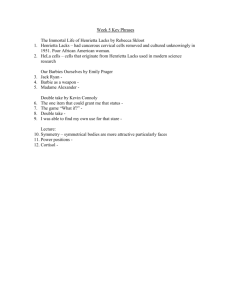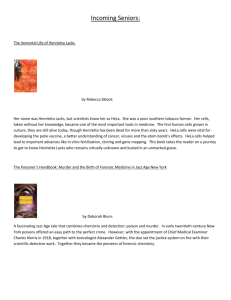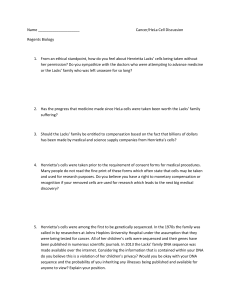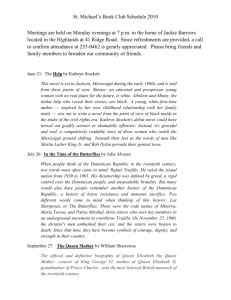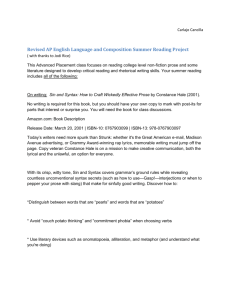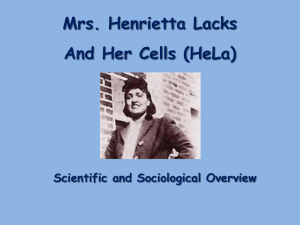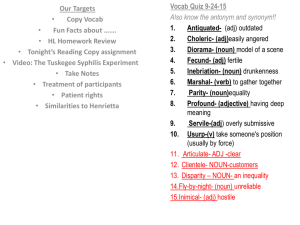Reading Log TILOHL
advertisement
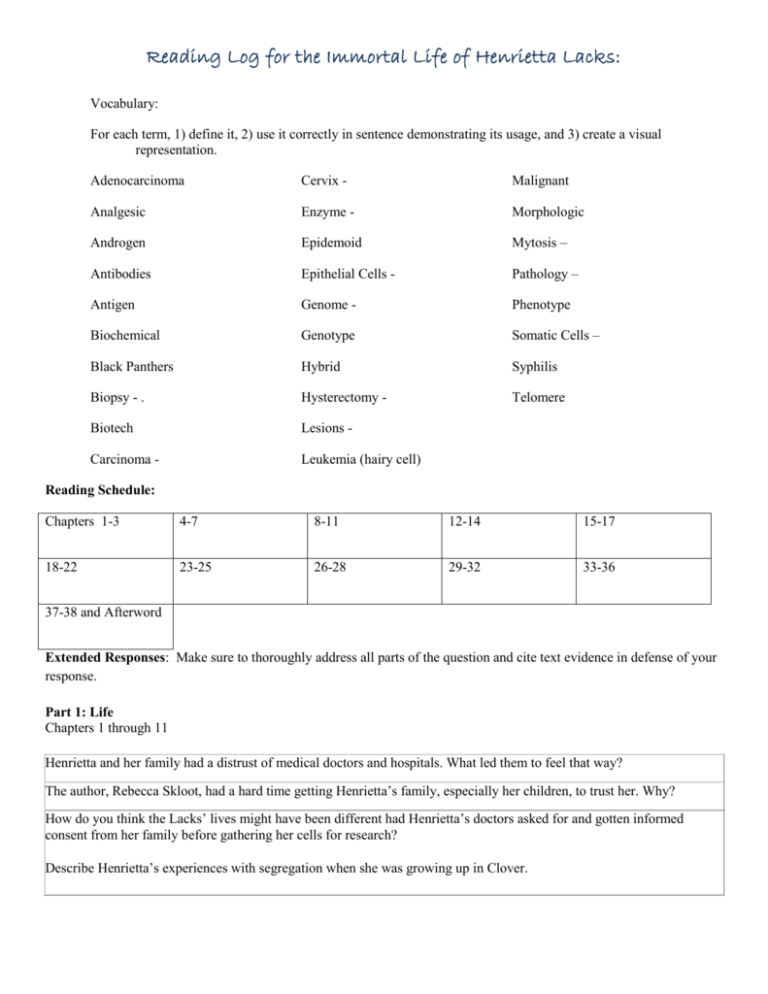
Reading Log for the Immortal Life of Henrietta Lacks: Vocabulary: For each term, 1) define it, 2) use it correctly in sentence demonstrating its usage, and 3) create a visual representation. Adenocarcinoma Cervix - Malignant Analgesic Enzyme - Morphologic Androgen Epidemoid Mytosis – Antibodies Epithelial Cells - Pathology – Antigen Genome - Phenotype Biochemical Genotype Somatic Cells – Black Panthers Hybrid Syphilis Biopsy - . Hysterectomy - Telomere Biotech Lesions - Carcinoma - Leukemia (hairy cell) Reading Schedule: Chapters 1-3 4-7 8-11 12-14 15-17 18-22 23-25 26-28 29-32 33-36 37-38 and Afterword Extended Responses: Make sure to thoroughly address all parts of the question and cite text evidence in defense of your response. Part 1: Life Chapters 1 through 11 Henrietta and her family had a distrust of medical doctors and hospitals. What led them to feel that way? The author, Rebecca Skloot, had a hard time getting Henrietta’s family, especially her children, to trust her. Why? How do you think the Lacks’ lives might have been different had Henrietta’s doctors asked for and gotten informed consent from her family before gathering her cells for research? Describe Henrietta’s experiences with segregation when she was growing up in Clover. Reading Log for the Immortal Life of Henrietta Lacks: Why were jobs at Sparrows Point so attractive to black men even though they were paid less than white men doing the exact same jobs? What was the current medical thinking about cervical cancer at the time of Henrietta’s diagnosis? Comment on the use of radium as a cancer treatment and as a cause of cancer. Carefully read the permission form Henrietta signed before her surgery. Given that she had a sixth grade education do you think she understood what she signed? Why did Roland Pattillo ask Rebecca what she knew about African‐Americans and science before he would give her Deborah’s phone number? Why do you think Deborah deferred to “the men” when making a decision about whether or not to talk with Skloot? What does “benevolent deception” mean, according to this author? Why did the doctor say that Henrietta was “a miserable specimen”? Do you think that Henrietta received thorough and proper medical care? How did Turner Station change from the 1940s to the time the author visited there? Have you or someone in your family ever been sick and in great pain? Did members of your extended family including cousins come and help you or your family member? Though Henrietta’s family was not materially wealthy, could we say that the Lacks family was rich in other ways? Part 2: Death Chapters 12 through 22 George Gey, the first doctor who grew HeLa cells, wanted to keep Henrietta’s identity private, so he created the pseudonym Helen Lane. Why did he want to protect her identity? In chapter 17, a virologist, Chester Southam, wondered if scientists working with Henrietta’s cells could get cancer from handling the cells. What did he do to test the theory that cancer was caused by a virus or immune system deficiency? What is the Nuremberg Code and why was it established? What is the relationship to the text? Compare the experiments on and distribution of Henrietta’s cells done by the Tuskegee Institute with the Tuskegee syphilis studies (p. 50), both conducted by the same Institute at the same time. What are the similarities and differences between the two projects? Do you think that the good brought by research carried out using Henrietta’s cells outweighs the ethical offenses of Dr. Gey and his laboratory? Henrietta’s cousins called Ethel “that hateful woman.” In what ways did Ethel live up to that name? Choose three words to describe what life was like for Henrietta’s children in the years after her death. Reading Log for the Immortal Life of Henrietta Lacks: Why did Joe grow up to be such an angry child? What influence did Bobbette have on Deborah’s life? Do you think it would have been beneficial to Deborah if someone had told her more about her mom and Elsie? Why or why not? In your opinion, was the cancer research Dr. Chester Southam performed on patients truly immoral, illegal, and deplorable? Why or why not? What were the dangers and benefits of Southam’s research? How did the Nuremberg Code and the NIH affect the medical laws in place today? Predict what will happen to cancer research and scientific progress now the NIH has cracked down on medical ethics. Why were scientists worried that the medical field of tissue and cell culturing was becoming a disaster? What was going wrong? Up to this point in the book, what are some of the ways that HeLa cells have impacted medicine and medical research? Example‐ HeLa cells helped to create the Polio vaccination Why was the Cell Culture Collection committee formed? What was their job? What was the purpose behind fusing animal and human cells? Why were some people so against the idea of scientists fusing HeLa cells with animal cells? What exactly was the “HeLa Bomb”? Why do you think Henrietta’s family treated Rebecca differently than all the other reporters who wanted information? What made her different? Who were the night doctors and what did they do? What type of impact did they leave on society? What was the initial purpose of Johns Hopkins Hospital? Did the doctors uphold the original purpose? Why or why not? Why do you think no one informed the Lacks family Henrietta’s cells were taken? Why were family members not updated on what Henrietta’s cells were doing for science and medicine? Why were Lacks family members furious at the end of the chapter? If you were a member of Henrietta’s family, would you be upset about the HeLa cell situation? Why or why not? Did Susan Hsu act in an ethical manner when she spoke with the Lacks family? Why or why not? Part 3: Immortality Chapters 23 through 38 Reading Log for the Immortal Life of Henrietta Lacks: The Lacks had no idea that their mother’s cells had been harvested and used in research until 25 years or so after her death. The family was devastated to learn this and had no understanding of what happened or why. How do you think this could have been avoided? What responsibilities did the medical researchers, Johns Hopkins, and other institutions have toward the family? Through research using HeLa cells, scientists discovered what made these cells immortal. What did they discover? Does a patient retain rights to his cells and tissue after they are removed from his body? Should John Moore have received a settlement from this case? Why or why not? Did Golde act ethically and in the best interest of his patient throughout treatment? Provide examples to strengthen your argument. Why is doctor/patient confidentiality so important? Should the dead have rights to privacy? Why or why not? Choose three words that describe how you feel when someone doesn’t have respect for your privacy. How do you react to this? Zakariyya said, to Rebecca: “…we can’t even go see a doctor cause we can’t afford it. Only people that can get any good from my mother cells is the people that got money…” Discuss the ethical implications of Zakariyya’s statement. How do you think Ethel’s treatment of young Zakariyya (given name Joe) affected his adolescence then later‐life legal skirmishes? Discuss Lurz’s gentle statement to Deborah about her quest to learn details of Elise’s life: “Sometimes learning can be just as painful as not knowing.” Relate that statement to an event in your life. In the Afterward, Skloot discusses the ongoing debates among medical scientists, lawyers, ethicists, and others. Some feel it is the right of every person to have a say-so in how their cells are used or not used for research. Others believe it is everyone’s obligation as members of society to donate (without compensation) their tissues for the good of society because that is how new drugs and treatments are discovered. What do you think?
